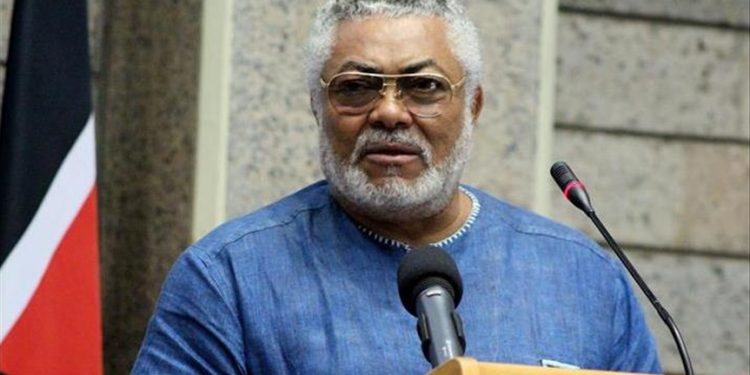Rawlings, who ruled Ghana for 2 decades with an eye for more democracy, died on Nov. 12, 2020.
ACCRA, Ghana
Africa must be grateful to late Ghanaian leader Jerry John Rawlings for establishing a game-changing democratic transitional mechanism which set an example for the continent, according to his former aide Donald Agumenu.
Speaking on the first anniversary of the death of the former president, Agumenu said it was incumbent on Africa to pay tribute to his boss, who “set up a second-to-none record by peacefully transitioning from military rule to constitutional rule and also for transferring power … from his party to the opposition party,” to multi-party democracy.
Rawlings, Ghana’s longest-serving head of state with two decades of rule, died on Nov. 12 last year, age 73, to the shock of his fellow countrymen, as he showed no apparent hint of illness.
“God sustained Rawlings for a divine assignment to bring the kind of transformation that Ghana and for that matter, Africa, needs,” Agumenu, who worked closely with Rawlings and served as his aide, told Anadolu Agency.
“A wave was blowing at a point that the nation needed somebody badly. And God was timely by introducing Rawlings. No wonder people referred to him as ‘Junior Jesus’,” he added.
One man, 2 leadership roles
Rawlings seized power in Ghana twice (in 1979 and 1981), but restored democratic and constitutional rule in the country in 1992 before handing over power to the opposition New Patriotic Party (NPP) in 2001.
Following the failed coup of May 15, 1979, Rawlings was arrested and put on trial for treason, a charge which carried the death penalty. But he mysteriously escaped execution when junior Ghana Armed Forces officers removed him from detention and later, on June 4, 1979, overthrew the country’s military government of Gen. Fred Akuffo.
But instead of taking direct control of the affairs of the state, Rawlings rather handed the leadership over to a civilian, Hilla Limman, who won the presidential election after a brief transitional period.
Two years later, Rawlings fired Limann amid economic hardship and stayed in charge until 1992, when he took an unprecedented step to usher Ghana back to constitutional rule and multi-party democracy.
He contested elections twice, won resounding victories, and later resigned peacefully after the end of his tenure of office, as spelled out in Ghana’s 1992 Constitution.
Political observers on the African continent consider the democratic feat chalked up by Rawlings incredible and unimaginable, as many African leaders have shown the tendency to hold onto power as long as humanly possible.
Agumenu argued that Rawlings “set the pace in Africa for smooth democratic handover of power” and expressed happiness at how such peaceful democratic transitions are now being seen elsewhere on the continent.
“That phase is something that Africa and the new generation must take seriously, because it is not easy with the level of energy that he had, coupled with his level of popularity, (as) even till the last day, he was a household name,” said Agumenu.
Asked whether Rawlings had regretted handing over power, Agumenu replied emphatically no, quickly adding that as a distinguished leader, Rawlings recognized the impact of critical decisions and leadership dynamics.
“Rawlings used to say something: ‘No revolution, no coup will succeed unless it is owned by the people.’ He understood human nature and human behavior. He understood societal behaviors, the plight of the people. And he was so deep-rooted in the feelings of the people and was closely in touch.”
Why switch from military to constitutional rule?
As a military ruler, Rawlings wielded a great deal of power. It was not expected that he would embrace constitutional rule and multi-party democracy, where other state institutions are empowered.
Agumenu, who is also an expert of leadership and governance, explained; “Rawlings didn’t take decisions based on emotions or mere motivations or get-rich-quick mechanism or to ascend to power or in search of power or the presidency.
“No! He took those decisions based on principles.
“He took those decisions for the people irrespective of their party affiliation, creed, and culture. Rawlings superintended over the creation and the approval of the 1992 Constitution of Ghana, the supreme law that has guided the country until today.”
The switch by Rawlings ushered in Ghana’s Fourth Republic which has seen smooth transitions and so far produced five presidents.
Coups on the rise
Recent times have seen attempted or successful coups in Africa occurring more frequently, with Sudan being the latest after Niger, Guinea, and Mali, all taking place just this year.
The coups have largely been blamed on greed, with the heads of states altering their constitutions to satisfy personal needs, something Agumenu firmly believes Rawlings would not condone.
“Rawlings would not endorse people not relinquishing power. No, that was not his nature,” Agumenu argued
“He would always tell you the power was for the people and still the power is for the people. So, you need to know when the beat is off. And he was so passionate on the need to perpetuate the rule of law, accountability, and social justice.”






